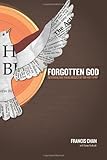
This is the first book I’ve read from Francis Chan. By all accounts his “Crazy Love” is an excellent read. And Tim Chester gave this book a ringing endorsement this week too.
The book is subtitled “Reversing our tragic neglect of the Holy Spirit”. As someone who has come from a charismatic background, it does seem a little strange to hear the Holy Spirit referred to as the “Forgotten God”. If anything, those in my circles are often accused of an over-emphasis on the Spirit. Which perhaps explains why I really felt as though I was not quite in the “target audience” for this book.
Chan seems to be aiming at a popular level, perhaps at those who rarely read theology books, and at those who theologically occupy a middle ground somewhere between cessationism and full-blown pentecostalism.
The first two chapters are devoted to urging us to be willing to completely rethink our opinions on the Holy Spirit, returning to the Bible. This is sound advice, but I didn’t feel he went on to overthrow any existing beliefs I had. His chapter on the theology of the Spirit is only the briefest of overviews of Biblical teaching on the Spirit.
Scattered throughout the book are short biographical accounts of people that Chan considers to be “Spirit-filled”. The focus is (perhaps deliberately) not on those whose lives have been characterised by miracles or supernatural gifts, but on those who showed extraordinary godly character (fruit of the Spirit) and who took bold steps of faith to serve the poor. It is a helpful reminder that the Spirit-filled life is not always necessarily a spectacular one.
There is a chapter on the importance of having a real relationship with God through the Spirit. Chan picks out “comfort” and “volume” as being two things that hinder us from truly connecting with God – we are too comfortable or too busy to have a deep relationship with God (see Tim Chester’s post for these obstacles to intimacy).
Another chapter warns against being so focused on God’s will for your life (i.e. your future plans) that you forget to follow him in the now. He reminds us that we do not invite Jesus to follow us around, but we are to follow him. The call to take up our cross is a call to a radical faith. And this is Chan’s passion – that we would settle for nothing less than a life sold out to following Jesus – a life following the Spirit. He argues the same for churches in the final chapter. It is too easy for a church to rely on simply doing things well. But even if it brings growth, without the Spirit, it is meaningless.
Overall I felt there were many things about the Holy Spirit that were left unsaid in this book. And to be fair, Chan has deliberately kept the book short and accessible. He has a great way with words, and it won’t take you long to read through. The book’s chief strength is not as a theology of the Spirit, but as a challenge to live radical lives following the lead of the Spirit. It would be a good place to start for a Christian who has thought little about the Holy Spirit before. And the call to a more radical, wholehearted following of Jesus as we are led by the Spirit is one that all believers and local churches, desperately need to heed.
